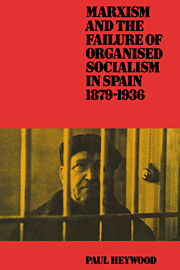Book contents
- Frontmatter
- Contents
- Preface
- Abbreviations used in text
- 1 Decaffeinated Marxists: the PSOE, 1879–1914
- 2 Reform, revolution and the roots of rupture: the PSOE, 1914–1919
- 3 Socialist schism and the development of organised Communism, 1919–1923
- 4 Dealing with a Dictator: organised Socialism, 1923–1931
- 5 Marxist mistakes: misinterpreting the Second Republic, 1931–1934
- 6 Marxism marginalised: the PSOE and the creation of the Popular Front, 1934–1936
- Conclusion
- Notes
- Bibliography
- Index
2 - Reform, revolution and the roots of rupture: the PSOE, 1914–1919
Published online by Cambridge University Press: 08 September 2009
- Frontmatter
- Contents
- Preface
- Abbreviations used in text
- 1 Decaffeinated Marxists: the PSOE, 1879–1914
- 2 Reform, revolution and the roots of rupture: the PSOE, 1914–1919
- 3 Socialist schism and the development of organised Communism, 1919–1923
- 4 Dealing with a Dictator: organised Socialism, 1923–1931
- 5 Marxist mistakes: misinterpreting the Second Republic, 1931–1934
- 6 Marxism marginalised: the PSOE and the creation of the Popular Front, 1934–1936
- Conclusion
- Notes
- Bibliography
- Index
Summary
Spain's neutrality during the First World War ensured that this most bloody of struggles aroused little passion amongst the great mass of Spanish citizens. Whereas their European counterparts were profoundly affected by involvement in a conflict which was inescapably to alter the normal course of their lives, the denizens of Spain experienced little immediate alteration to their daily routine following the outbreak of war in 1914. However, it would be mistaken to assume that the war had little impact in the Iberian peninsula. On the contrary, it was instrumental in destabilising the so-called turno pacífico, the political system of the Restoration Monarchy, which, since 1875, had maintained both political and economic power in the hands of an agrarian-based reactionary coalition of latifundistas and the haute bourgeoisie. The economic impact of the war was enormous. Rapid industrial expansion occurred, particularly in northern regions, as Spain took advantage of her neutrality to become a major supplier to the belligerent powers. The dramatic economic boom, however, gave rise to changes of the deepest significance within the existing social and political order. Although short-term benefits to the Spanish economy were spectacular, with a massive rise in the resources of the Bank of Spain, the longer-term impact was highly damaging. Unable and unwilling to respond to pressures for infrastructural modernisation, the ruling oligarchy simply engaged in capital accumulation and conspicuous consumption on a scale unknown since the heyday of Spain's Latin American empire.
There are four direct and linked economic consequences of the First World War which require emphasis here.
- Type
- Chapter
- Information
- Publisher: Cambridge University PressPrint publication year: 1990

